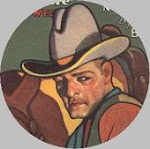"How do you know?"
"I added cream and it didn't change color."
I nodded. "Strong stuff."
Strong stuff is what I've encountered not only in my beverages but also in my reading lately.
I've recently read the first Edge novel and the second entry in that long-lived series. (The first Edge novel, The Loner, was published in 1971. The last entry in the series was published in 1989. I'm just now getting around to it. I'm more like the tortoise than the hare.) Famously and accurately blurbed as "The Most Violent Westerns in Print!" Any virtues (and there are very few) the other characters exhibit are overshadowed by the primary character's apparent amorality.
Edge starts out as Josiah Hedges, returned from the War Between the States to find his younger brother tortured and murdered. He sets out on a vengeance trail. Hardened by war and heartbreak, Edge is a killing machine, cold and ruthless.
Fashioned to take advantage of the surge of popularity in the Spaghetti Western films of the time, the Edge series features a lot of hard-boiled, ugly characters in noirish situations. Author Terry Harknett -- working under the George Gilman pseudonym -- writes a sharp-paced, snappy narrative with flares of black humor. But the entries I've read have a far stretch to go before reaching the epic and nuanced development of Sergio Leone's The Good, The Bad, and The Ugly or even My Name is Nobody.
Edge and most of the other Piccadilly Cowboy westerns were nearly all published with a distinctive cover design, an easily recognizable style of cover paintings that helped readers quickly see that here was a book similar in mood and graphic violence like others published by New English Library (or, in the U.S., Pinnacle or Chelsea House). The covers and the packaging are attractive, and it's easy to see why readers were first tempted to purchase these books when they initially appeared.
The violent-action thrillers set in a contemporary setting that would have been the counterparts of the Piccadilly westerns would have been Don Pendleton's Executioner series. But from a purely packaging and marketing standpoint, I'd say the Piccadilly westerns had the upper hand.
I also recently read the second entry in the Jubal Cade series, Double Cross, which was
contemporaneous with the Edge series, and also penned by Terry Harknett and Angus Wells, who
belonged to the Piccadilly Cowboys. Jubal Cade is another ruthless character.
However, he debates with himself the appropriateness of his actions: he was
trained to be a physician, to heal people; but he will take a life as quickly as
stomping a bug if that person thwarts or threatens his plans. This debate is
highlighted in the novel I read when he shot and wounded an attacker, then was
captured by the attacker's brother, and had to tend to the wounded man's
injuries. Hard-boiled, just like the Edge books, but with a glimmer of morality
at least visible between the lines.
But there are few glimmers for hope, optimism, or morality in the Edge books. He takes the wandering antihero figure fashioned by Leone and Clint Eastwood to what may be its most extreme depiction in western series fiction. Edge is deadly, misogynistic, focused purely on self preservation -- as if his lizard brain is the only functioning part of his mind. Perhaps most telling about Edge is this description in the second book: "He
was a man without imagination."
Strong stuff has its place. But for me, a little reading of this type goes a long way. I think the next western book on my reading list will veer back more to the traditional mode.







